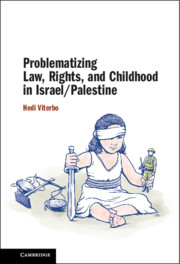Book contents
- Frontmatter
- Contents
- Acknowledgments
- Abbreviations
- 1 Conceptual and Theoretical Foundations
- 2 Casting the First Stone: The Israeli Legal System, Its Human Rights Critics, and Their Approaches to Young Palestinians
- 3 The Age of Governing: Young Age as a Means of Control
- 4 Boundary Governance: Amending Childhood and Separating Palestinians
- 5 Stolen Childhood: Voice, Loss, and Trauma in Human Rights Reports
- 6 Sights of Violence: Childhood in the Visual Battlefield
- 7 Infantilization and Militarism: Soldiers as Children, Children as Soldiers
- 8 Unsettling Children: Israeli Law and Settlers’ Childhood
- Index
1 - Conceptual and Theoretical Foundations
Published online by Cambridge University Press: 05 August 2021
- Frontmatter
- Contents
- Acknowledgments
- Abbreviations
- 1 Conceptual and Theoretical Foundations
- 2 Casting the First Stone: The Israeli Legal System, Its Human Rights Critics, and Their Approaches to Young Palestinians
- 3 The Age of Governing: Young Age as a Means of Control
- 4 Boundary Governance: Amending Childhood and Separating Palestinians
- 5 Stolen Childhood: Voice, Loss, and Trauma in Human Rights Reports
- 6 Sights of Violence: Childhood in the Visual Battlefield
- 7 Infantilization and Militarism: Soldiers as Children, Children as Soldiers
- 8 Unsettling Children: Israeli Law and Settlers’ Childhood
- Index
Summary
Chapter 1 lays the theoretical, methodological, and contextual foundations of this book. First, an overview is provided of the book’s key arguments, as well as its contribution to existing studies and debates. The chapter then offers a detailed rethinking of conventional wisdom about each of the book’s central themes: childhood, law, and human rights. Children, it argues, are not simply a preexisting group with inherently unique traits and needs but, rather, are a category largely manufactured by social forces. Key among these forces are law and children’s rights, both of which, for reasons explained in this chapter, have been complicit in state domination and violence. From there, the chapter places the subject matter in its political context. This is done by outlining the varying modes and degrees of control that Israeli authorities exercise over each of the following territories: Israel “proper” (within its pre-1967 borders), East Jerusalem, the rest of the West Bank, and the Gaza Strip. The methodology of this study is then discussed, and the book’s sources are described, along with the decisions that were taken in interpreting them, as well as the inaccessibility of some sources. Finally, an outline of the next chapters is provided.
Keywords
- Type
- Chapter
- Information
- Publisher: Cambridge University PressPrint publication year: 2021



